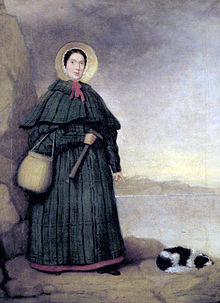Unless otherwise noted, the material on this page may be used under the terms of a
Creative Commons License.
| Biographies | ||
| Science | A |
| Biographies | Science | B |
| Science | Timeline |
| Science Biographies Timeline Glossary References |
Biographies A-Z A References |
Agassiz, Louis Swiss anatomist, geologist, paleontologist and ceaseless critic of Darwinian evolution. He studied under Cuvier in Paris, and later taught at Harvard. In 1861, the very year Archaeopteryx was discovered, Agassiz cited the reptile/bird gap as one which evolutionary theory could never surmount, a claim which Thomas Huxley effectively put to rest. Agassiz also described the first fossils attributable to ostracoderms, which would later be formally described as a taxon by E. D. Cope, and described the first fossils of coelacanths (and named them so). Agassiz was the first to recognize the Ice Ages. He was one of the earliest to study and recognize the extent of glacier advance in both Europe and North America. Glacial Lake Agassiz, the Pleistocene precursor to Lake Winnipeg, was named to honor his work in glaciology in North America. (EvoWiki)
Anaximander (c.610 b.c.e. - c. 546 b.c.e.) pre-socratic philosopher of Ionia. Develop a theory of abiogenesis and proto-evolutionary naturalism: he believed that humans and other animals developed from a fish-like organism and that life formed from mist. He described his theories in his book On Nature, but his book has been lost and most of our information on his theories come from second-hand quotes found in other books. Anaximander also believed there are multiple planets in the universe that harbor life. (from EvoWiki)

Anning, Mary (1799-1847) English fossil collector who made a number of dramatic discoveries in the Early Jurassic marine fossil beds at Lyme Regis, which shapef the Victorian (and hence the scientific) understanding of prehistoric life and the history of the earth. The tongue twister "she sells seashells on the seashore" is based on her. Wikipedia
Aristotle: (384-322 b.c.e.), student of Plato, ancient Greek polymath, who wrote on Logic, Physics, Astronomy, Biology, Psychology, Metaphysics, Ethics, Politics, Rhetoric, and Poetics. In biology, he made numerous very detailed observations, including many dissections; some of his observations have proved remarkably accurate. He also produced the first detailed taxonomy, dividing animals into blooded and bloodless ones, and from there into further subcategories, see Scala Naturae. His view of the history of life was non-evolutionary and non-creationist; he believed that the Universe is eternal, being pretty much the same for all time. Species don't evolve, but they had always been in existence. He also believed that living things have three types of vital force: the vegetable soul, that all living things have, the animal soul, that all animals have, and the rational soul, that only humanity has. (EvoWiki)
new page MAK111204